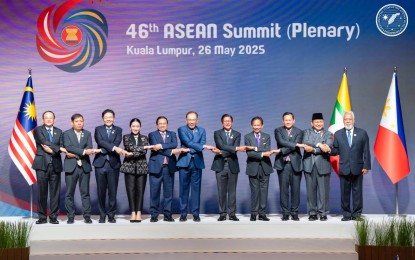MANILA – The Department of Foreign Affairs (DFA) joined the celebration of the 58th founding anniversary of the Association of Southeast Asian Nations (ASEAN), reaffirming the Philippines’ continued commitment to regional solidarity, cooperation, peace, and shared prosperity.
In a statement, the DFA highlighted the country’s dedication to advancing the principles enshrined in the Bangkok Declaration, which laid the foundation for the regional bloc’s creation in 1967.
“The Philippines remains committed to promoting a people-oriented and people-centered ASEAN, one that delivers real and tangible benefits to its citizens,” the statement said.
These benefits include greater access to quality education through ASEAN scholarships, enhanced disaster response, improved market access for micro, small, and medium enterprises (MSMEs), and the promotion of tourism through increased mobility within the region.
“Next year, the Philippines will assume the ASEAN Chairship for 2026. This presents a valuable opportunity for our country to help shape ASEAN’s priorities. We look forward to contributing to the region’s collective future, one that is peaceful, secure, and prosperous.”
Meanwhile, New Zealand’s Prime Minister acknowledged ASEAN’s 58th year and joined in the celebration, noting that ASEAN is the fourth-largest trading partner of his country.
“Our relationship is delivering economic growth at both ends; it’s a partnership that’s growing the pie for everyone,” he said.
He also thanked the Southeast Asian communities in New Zealand for their contributions to the country.
“You make New Zealand a much richer place — socially, culturally, and economically. And to all our ASEAN friends, here’s to 50 years of friendship and many more to come.”
Association of Southeast Asian Nations (ASEAN)
The **Association of Southeast Asian Nations (ASEAN)** is a regional intergovernmental organization established on **August 8, 1967**, by five founding members—Indonesia, Malaysia, the Philippines, Singapore, and Thailand—to promote political, economic, and cultural cooperation. Today, it includes **10 member states** (with Brunei, Cambodia, Laos, Myanmar, and Vietnam joining later) and focuses on regional stability, economic integration, and collaborative development. ASEAN plays a key role in fostering dialogue among member nations and global partners, with initiatives like the **ASEAN Economic Community (AEC)** enhancing trade and connectivity.
Kuala Lumpur, Malaysia
Kuala Lumpur, the capital of Malaysia, is a vibrant metropolis known for its modern skyscrapers, such as the iconic Petronas Twin Towers, alongside rich cultural heritage. Founded in 1857 as a tin-mining settlement, it grew rapidly under British colonial rule and became a major economic and cultural hub. Today, it blends Malay, Chinese, Indian, and colonial influences, offering bustling markets, historic landmarks like the Sultan Abdul Samad Building, and diverse cuisine.
Bangkok Declaration
The **Bangkok Declaration** was adopted on August 8, 1967, marking the founding of the **Association of Southeast Asian Nations (ASEAN)**. Signed by five original member countries—Indonesia, Malaysia, the Philippines, Singapore, and Thailand—it aimed to promote regional cooperation, economic growth, and stability in Southeast Asia during the Cold War era. The declaration laid the foundation for ASEAN’s expansion and its role as a key regional bloc in diplomacy and economic integration.
ASEAN scholarships
The **ASEAN Scholarships** are educational initiatives offered by the Singapore government to outstanding students from ASEAN member countries (excluding Singapore) to study in Singapore at the secondary, pre-university, and university levels. Established to promote regional cooperation and human resource development, these scholarships cover tuition, living allowances, and other expenses, fostering academic excellence and cultural exchange among ASEAN nations. The program reflects Singapore’s commitment to strengthening ties within Southeast Asia through education.
ASEAN Chairship
The **ASEAN Chairship** is an annual rotating leadership role among the ten member states of the Association of Southeast Asian Nations (ASEAN), established in 1967 to promote regional cooperation. Each chair oversees ASEAN meetings, sets the annual agenda, and represents the bloc internationally, with the position rotating alphabetically by country name. The chairship plays a key role in advancing ASEAN’s goals, such as economic integration, political stability, and cultural exchange.
New Zealand
New Zealand is an island country in the southwestern Pacific Ocean, known for its stunning landscapes, Māori culture, and unique biodiversity. Originally settled by Polynesians (the Māori) around 1300 CE, it was later colonized by the British in the 19th century, leading to the 1840 Treaty of Waitangi, a foundational document in New Zealand’s history. Today, it is a multicultural nation celebrated for its indigenous heritage, outdoor adventures, and environmental conservation efforts.






